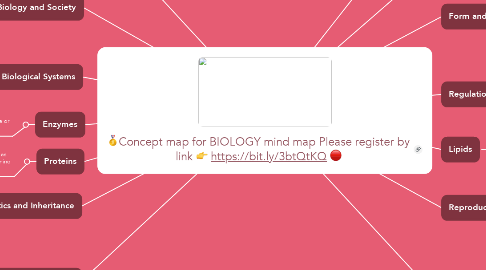
1. Interaction With the Enviroment
1.1. Each organism interacts with its environment.
1.2. Example: Plant obtains water and nutrients from the soil, carbon dioxide gas for the air, and energy from sunlight
1.3. Continuous cycle of interactions
1.4. Many interactions with your environment - you are constantly sensing and reacting to the changes in your environment
2. Biology and Society
2.1. Biology changes our everyday life when it comes to medicine and agriculture.
2.2. Stem cell research, air pollution, genetically modified crops are all related to biology.
3. Biological Systems
3.1. Organisms are living systems.
3.2. Just like an ecosystem our bodies are dependent on how our systems interact
4. Enzymes
4.1. Enzymes either synthesise or decompose substrate
5. Proteins
5.1. Proteins which are also known as polypeptides are a chain of amino acids
6. Genetics and Inheritance
6.1. You gain genes from your parents and inherit their dominant or recessive traits
6.1.1. This is a complex topic that stretches through co-dominance, incomplete dominance/ intermediate inheritance, and polygene inheritance
7. The Cellular Basis of Life
7.1. All organsims have cells that operate for specific functions
7.2. An organism's development are based on the functions and interactions of it's cells.
7.3. Many levels of organisation such as the nerve cells which leads to nerve tissue which then leads to the brain
8. BIOLOGY mind map
8.1. A book (biology) 1. what it was about 1.1. biology: (ACTUALLY) textbook for university. 1.2. It includes interesting topics, ranging from mitosis /maɪˈtəʊ.sɪs/, meiosis /maɪˈəʊ.sɪs/ to photosynthesis, 1.3. I don't find it hard to understand because of 1.3.1. many colourful illustrations (hình minh họa) and diagrams (sơ đồ) 1.3.2. as well as interesting facts (con số thực tế) 2. enjoy = be into = be fond of 3. helps me a lot in my studies 4. what is more = besides = moreover 5. how long it took you to read 5.1. why you read it 5.1.1. highly recommended us to read 5.1.1.1. provide in-depth/profound knowledge of the subject 5.1.1.2. involve lots of digrams 5.1.1.2.1. easy to remember for a long time 5.1.1.3. is written/organised in a logical way --> (so/therefore) pretty easy to grab the main ideas compared to/with (in comparison with) our current textbook 5.2. started reading the book since last Wednesday and I am in page 10 or so now. 5.3. And I guess it might take up to a year to read and learn the whole thing in that book. (YOU KNOW) It is a pretty thick book and I have a HECTIC (busy) schedule. 6. why you enjoyed it 6.1. First, logical to read and easy to understand 6.2. attractive (APPEALING) thanks to their great diagrams
9. Adaption and Evolution
9.1. An adaptation is an inherited trait that helps an organism to survive.
9.2. Example: Camouflage is something that the mantid species has adapted to.
9.3. If a particular evolution is helpful, that organism will live for longer, therefore allowing it to have more off-spring
10. Scientific Inquiry
10.1. All organsims have cells that operate for specific functions.
11. Form and Function
11.1. Your body is made to suit your lifestyle - likewise for animals.
11.2. The way we function is dependent on our form
11.3. Example: A bird's aerodynamic wings allow it to fly
12. Regulation
12.1. An organisms ability to regulate their internal conditions.
12.2. Example: How your brain signals for you to sweat when your body is heated up.
13. Lipids
13.1. Lipids are large non polar organic molecules that do not dissolve in water
14. Reproduction and Inheiritance
14.1. Looks and features are dependent on your parents - genes are responsible for family resemblance
14.2. Information rich molecules called DNA are in every cell in your body.
15. Energy and Life
15.1. A source of energy is the reason we can work
15.2. Humans obtain energy in chemical form - sugars, fats, and other molecules in our food
15.3. Ecosystems consist of producers (producers make the food that the entire ecosystem depends on) and consumers (consumers are the organisms that eat the food made by the producers)
16. Concept map for BIOLOGY
16.1. Marine Biology
16.1.1. 1. The start and discovery of Marine Biology was in 1728, when Captain James Hook started the first of his many voyages in order to map the ocean for the British Navy. Marine Biology and the overall science of Oceanography impact topics such as climate change, overall Earth exploration/understanding, and even manage to discover new species almost daily on the planet. 1.1. In what ways does the study of Marine Biology effect climate change? 1.1.1. What is the impact of Marine Biology on the United States efforts for climate change? 1.1.2. How does Marine Biology positively/negatively impact public opinion on climate change, and what does this do for the overall goal for Marine Biology? 1.2. What is the overarching goal of Marine Biology? 1.2.1. What complications are we running into as we progress as a society where Marine biology may be unable to continue? 1.2.2. What is the difference between 20th century Marine Biology's goal and the current day and age? 1.3. How does Marine Biology and Oceanography impact the growth of our planet? How is it still important to understand a planet that has been lived on for billions of years? 1.3.1. How is Earth still growing? How does Marine Biology assist in proving this fact? 1.3.2. What impact does humanity have on growth on Earth, particularly in the oceanic and aquatic landmarks? 1.4. How are new species of life still being discovered on Earth? What does this mean for our planet? 1.4.1. What does this discovery of new species mean for the planet and for humanity? 1.4.2. How can people on the planet better facilitate more discovery of these different species?
